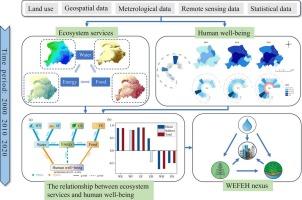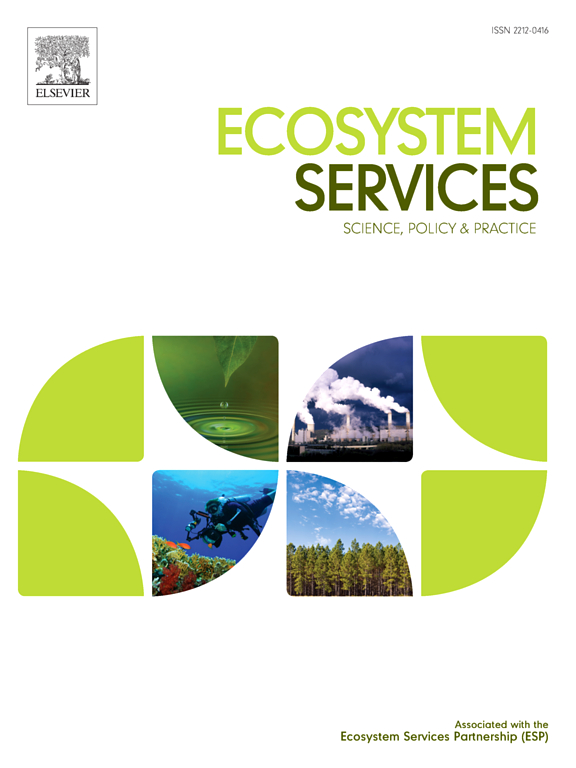Relationships between ecosystem services and human well-being from a water–energy–food nexus perspective: A case study of Jiziwan, Yellow River Basin, China
IF 6.6
2区 环境科学与生态学
Q1 ECOLOGY
引用次数: 0
Abstract
The sustainable management of water, energy, and food is crucial for achieving regional development, especially in areas facing resource scarcity. However, the connections between ecosystem services (ESs) and human well-being (HWB) remain underexplored, particularly within the context of the water–energy–food nexus (WEF- nexus). This study investigates the spatiotemporal dynamics of ESs and HWB in the Jiziwan region of the Yellow River Basin from 2000 to 2020, using partial least squares structural equation modeling (PLS-SEM) to examine the interactions between these variables. Our results show that the four key ESs—water yield, sand fixation, carbon sequestration, and food supply—exhibit similar spatial patterns, with values decreasing from southeast to northwest, alongside an improving trend over time. HWB indicators overall increased, with the exception of good social relations, which declined. We found that the water and food systems positively impacted HWB, while the energy system showed a negative effect. These findings highlight the importance of integrating ESs into regional governance frameworks to enhance HWB, with implications for sustainable development in other regions facing similar resource challenges. The study provides a theoretical foundation for developing ESs management strategies from a WEF-Nexus perspective that can be applied to other water-scarce, resource-dependent regions worldwide.

水-能-粮关系视角下生态系统服务与人类福祉的关系——以黄河流域鸡子湾为例
水、能源和粮食的可持续管理对于实现区域发展至关重要,特别是在面临资源短缺的地区。然而,生态系统服务(ESs)与人类福祉(HWB)之间的联系仍未得到充分探索,特别是在水-能源-食物关系(WEF- nexus)的背景下。本文利用偏最小二乘结构方程模型(PLS-SEM)分析2000 - 2020年黄河鸡子湾地区生态环境质量和生态环境质量的时空变化特征。研究结果表明,4个关键的生态系统-水量、固沙、固碳和食物供应-呈现出相似的空间格局,从东南向西北递减,随着时间的推移呈提高趋势。除了良好的社会关系外,HWB指标总体呈上升趋势。研究发现,水系统和食物系统对HWB有正向影响,而能源系统对HWB有负向影响。这些发现强调了将可持续发展纳入区域治理框架以加强可持续发展的重要性,这对面临类似资源挑战的其他区域的可持续发展具有启示意义。该研究为从WEF-Nexus的角度制定可持续水资源管理战略提供了理论基础,该战略可应用于全球其他水资源短缺和资源依赖地区。
本文章由计算机程序翻译,如有差异,请以英文原文为准。
求助全文
约1分钟内获得全文
求助全文
来源期刊

Ecosystem Services
ECOLOGYENVIRONMENTAL SCIENCES&-ENVIRONMENTAL SCIENCES
CiteScore
14.90
自引率
7.90%
发文量
109
期刊介绍:
Ecosystem Services is an international, interdisciplinary journal that is associated with the Ecosystem Services Partnership (ESP). The journal is dedicated to exploring the science, policy, and practice related to ecosystem services, which are the various ways in which ecosystems contribute to human well-being, both directly and indirectly.
Ecosystem Services contributes to the broader goal of ensuring that the benefits of ecosystems are recognized, valued, and sustainably managed for the well-being of current and future generations. The journal serves as a platform for scholars, practitioners, policymakers, and other stakeholders to share their findings and insights, fostering collaboration and innovation in the field of ecosystem services.
 求助内容:
求助内容: 应助结果提醒方式:
应助结果提醒方式:


